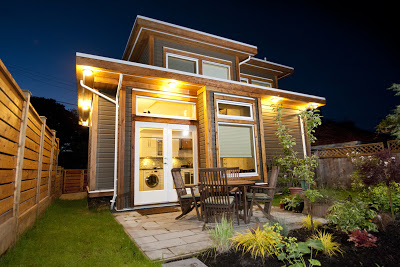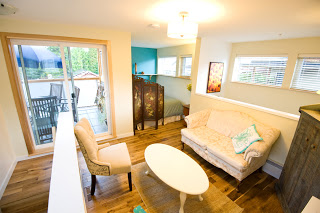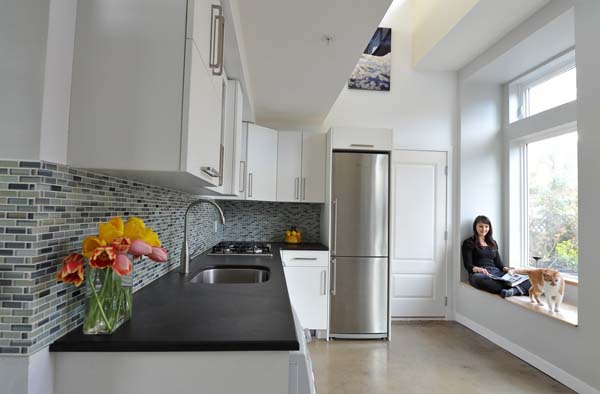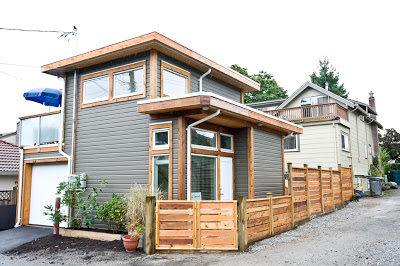By Alyse Nelson
Akua Schatz and Brendon Purdy’s dream was to live near relatives, but they couldn’t afford a home in Vancouver, BC’s Dunbar neighborhood. Instead of moving to the suburbs, they decided to build a 500-square-foot laneway home in Brendon’s parents’ backyard.
A few years ago, this wouldn’t have been an option for the young couple. Rules for laneway houses, as these backyard cottages are called in Vancouver, were adopted in 2009. Laneway homes are small backyard cottages that face alleys in traditional single-family neighborhoods. The density is hidden from the main neighborhood streets, leaving the appearance of Vancouver’s single-family neighborhoods intact. But while you might not see this hidden density, it could have a huge effect on the number of people able to call Vancouver home – nearly 70,000 single-family lots are eligible for an additional dwelling unit.
The Vancouver regulations allow a one-bedroom 500 square-foot laneway house on 33-foot by 122-foot single-family lots. The larger 50-foot wide lots can have a two-bedroom 750 square-foot cottage.
As homeowners build small dwellings, they provide lower-cost housing within the existing fabric of their neighborhood, with no government support necessary. Vancouver’s planning director, Brent Toderian, sees this as the essential value of the trend towards small homes: “[It’s] about ordinary people. Thousands of individual homeowners can do it, one by one by one. It’s publicly propelled, not corporate-propelled densification. It’s gradual. It’s discrete. It’s green.”
Small homes combat neighborhood decline brought on by shrinking household sizes. Adding people can revitalize a neighborhood, allowing schools to stay open, giving neighborhood businesses more customers, making transit service cost-effective, and saving on infrastructure costs. Infilling neighborhoods with backyard cottages helps add more people to a neighborhood, without altering its character.
In a city where the average home price is $725,086, laneway homes can cost between $185,000 for an average home and $340,000 for an up-scale laneway dwelling.

Schatz and Purdy spent about $280,000 to build their one-bedroom laneway home. Their home may be small, but it is only a 10-minute bicycle ride to Schatz’s office. When choosing between their backyard cottage and a larger house in the suburbs, it was a no-brainer: “You’re looking at three-hour commutes, and I just don’t want to spend my life doing that,” she told the National Post.

There’s another plus to their backyard home: Schatz and Purdy recently gave birth to their first child and have babysitters just feet away from their front door. Their eventual plan is to switch places with Purdy’s parents and live in the larger home as their family grows.

Schatz suggests redefining success: “It’s really a North American concept to have success tied to moving away or distancing yourself, so maybe we’re reinventing what it means to be successful, and that means keeping family close.”
This post is adapted from a full article published here: http://daily.sightline.org/2012/12/20/tiny-homes/
Bio: Alyse Nelson is an urban planner for a small town in Kitsap County, Washington. She is a Writing Fellow for Sightline Institute.

WOW ! Fantastic small home. Lots of style. Refreshing to see a grounded small house.
Great post, lets see more like this.
Go Dunbar! I used to live over on West 11th near UBC. It’s fun just to wander through those neighborhood lanes. Lovely small house, very classy and a great story. One question, since it appears that your bedroom is on the first floor, what is upstairs? How about closet space? Thanks for such a nice example of a small house. I only wish you did not have to pay so much for it 🙂
It was fun to watch these two blog while they were building. The bedroom is actual upstairs and you can take a look at the house plans here: http://smallworks.ca/houses/westcoast500.html
Smallworks has made quite a few cute little homes, another favourite of mine is the Dunbar and the couple that built it blogged about it too.
It’s beautiful, but holy cow that’s expensive construction!!! I’m really curious how this tiny place managed to eat up $280k??
Deborah, while it’s true Canada more tightly regulated market meant we didn’t get hit with the housing bubble that happened in the U.S., the housing costs in this story reflect Vancouver specifically, not Canada as a whole. In some of these older, more upscale neighbourhoods, the housing costs are astronomical, and have never lost value. I lived as a renter in Vancouver for four years in the mid 90’s. These types of laneway house are really the only way average young people can even think about home ownership, and I’m glad to see the city is willing to think outside the box in order to re-vitalize these long-established neighbourhoods.
That does not explain the cost to build new? The neighborhood can explain permits, taxes but where did the astronomical labor and materials come from?
I can answer this question as I own and am renovating (endlessly!) a house in Vancouver, have built another house down the street, and looked into laneway houses when we were deciding what to do in our own backyard.
The costs of tying into the systems of sewage and gas/electric have made putting a laneway house in Vancouver completely ridiculous. This probably accounts for a third of the costs of a build, if one is careful about costs.
The houses in question and, in particular that one on Dunbar, are located in one of the tonier parts of the city. The houses are easily selling right now for 2.5 to 3.5 million dollars. One could easily spend $300,000 plus to buy a property in the valley and commute an hour or more a day, but many of us don’t want to for environmental and quality-of-life reasons.
Building and renovating, particularly if you are not doing it yourself, is quite costly in Vancouver. It can be quite challenging to get trades people, and their rates reflect the crazy times we are in here. I don’t think trades people are getting rich, by any stretch, but they are making enough money to live in this expensive corner of the world.
I would expect that the Dunbar laneway house is kitted out with some pretty high end appliances, which could also push the price higher than it needs to be. As well, the trend here, particularly for people with younger children, is to buy products that are not toxic, that do not off gas. Many of us also look to making less of an impact on the environment and on workers, so this also drives our prices higher. Personally, we had opportunity pulled wood flooring out of houses that we or others demolished for most of are renos, which saved us a lot of money.
When you consider this whole story, that they are living in one of their family’s backyard, with an eye on switching houses one day, they have invested quite wisely. Especially if they enjoy a good, functional relationship with their family.
However. These people are the exception. I own a house because my father-in-law backed us some 20 years ago when the market was just starting to heat up. I would imagine many of the above people who are expressing a nonchalance attitude toward the cost of building this house are living westside lives that allow them to think of that as small change. To many of us in Vancouver, it is not.
Building a relatively small house for that amount of money blew my mind. We couldn’t see how it would pay off for us to add that to our property and make back our investment. Instead, we knocked down our garage (we sold our car and bus, car co-op and bike to save money and fossil fuels) and put in some grass for our kids and their friends to enjoy. I’m thinking of building a structure up with an old gas stove and some counters to be able to cook more outdoors sometime soon.
I peruse this blog because I think one day we could build one of these mobile houses to use on the property, perhaps as a guest house. That would help us to avoid the cost of hooking up to the grids.
I hope this adds to the conversation and gives fair context to some of the nonchalance of my fellow Vancouverites.
From what I am reading, the housing market in Canada is just now starting to collapse….these prices are unsustainable no matter where in the world you live. I watch the show on HGTV with the two Canadian brothers, and just gasp at the prices they quote….
It does seem crazy but the reality is, it costs a lot to build in this neck of the woods. It’s also worth considering that the homes we see built by Smallworks are for people looking to build in an ecologically sensitive manner so it’s not just your average slap together home either.
It also costs a fair bit to upgrade utilities to the main house and the lanehouse, and the landscaping tends to be to a high level so that the new housing fits in.
Yes, it’s a high price to pay, but for what these guys are spending you can’t even find a decent bachelor suite!
Very nice, but those home prices are out of this world!! I heard that Canada has not been hit by the housing bubble yet…looks like they need to!!!
This is a great little house. Saw a story about it posted elsewhere before and loved it. The other one I saw has more pictures and plans for both floors http://tinyurl.com/aop685p
What a pretty house. It’s great that they’ve been able to find a way to stay close to family; too many people have defined success as being away from family for far too long.
I agree it’s beautiful, way nicer than my ~500 ft2 home I currently live in … and I’d sure like to see a breakdown of costs? The total is greater then $500 a ft2, a breakdown of land cost, permits, impact fees, and construction costs would be nice. I love that it has a porch and a garage … I could only wish this city would that kind if insight.
Wow i love the home, the zoning change is smart but the cost is outrageous , thats 560 dollars a sq ft. Does that include the price of the land and how much did permitting cost?
The laneway housing rules do not permit separate title so if parents own the lot with the old house, they also own what’s under this one.
There are a lot of costs though that we’re not used to seeing – upgrading utilities to serve both homes, landscaping after the fact (all that underground service work makes quite the mess) and the construction of these homes is not basic at all. I personally think Smallworks homes are awesome and for what options we have in this city, they’re not really out of line at all.
$280,000 / 500 sq feet = $560 / sq ft?
Talk about indentured servitude, they have to work for thirty years to pay that off?
Great house and, considering Vancouver real estate prices, $280K is a good deal for a great location. Granted, considering they didn’t have to purchase the property… yeah, ouch… they got kind of hosed. But, who cares, as long as they’re happy.
Considering most laneways don’t have the proper sewer and water services as on the street, that’s a fairly big expense when dealing with the city to implement that infrastructure. Plus… it doesn’t look like the owners actually did any of the work, so paid for everything. Could be done much cheaper for the DIYer, sure.
I really wish Toronto would allow more of these to be built. Granted, in my area, the Annex, somebody sold the single car garage portion of their property last year (basically the space where a laneway house would go) for $140K. For a non-DIY person, property + architect + contractors + permits = $285K easily. And that would be a steal to actually own a place in this location. I’d do it in a second (though, being a handy person, I’d design and build myself saving a bunch).
A cheap condo is way more than that, and that comes with monthly condo fees. Personally, I’d much rather have something like this. Granted, I wouldn’t want to be that close to my family :).
I live in New Mexico and that could be easily built for 100,000 with comparable quality.
The balcony seems redundant with the patio, especially since the bed barely fits.
I think it’s pretty wonderful that a couple starting a family and doing well financially would choose this an their home option, being close to family, avoiding long commutes and having a plan for the future.
Not everyone who lives small does so for financial reasons, nor does everyone who lives small choose the backcountry. This sort of story shows me that the idea of less is more is spreading across a lot of sectors of our societies and that is a great thing.
Smart on a whole lot of levels for this city to open wide the doors to this sort of choice.
These houses are not on separate lots, they are built behind the existing house and often replace old garages. Many are built for rental, some for family. You can’t sell one on it’s own, it goes with the main house. Land and construction costs in Vancouver are shocking and a lot of the laneway houses are being built with very luxurious options that raise the price, as well as money spent on professional services like architects. $200 square foot costs are for pretty average places and a house that will be torn down can cost over $800,000 or more in some areas. The rules are being changed to allow more laneway houses in more areas and more of the square footage to be on the ground instead of stacked as it is now. This will be good for people who need single level homes and also keep the height down to placate neighbours. Though there have been a decreasing number of complaints from neighbours since the first laneway houses were built; people are getting used to them. http://vancouver.ca/home-property-development/laneway-houses-and-secondary-suites.aspx https://www.bcbusiness.ca/real-estate/change-coming-to-vancouvers-laneway-housing-program
It’s good to know that the experience has been so positive. Where I live in Minneapolis, many older houses were built this way – 100 years ago, people would buy a lot, build a small house on the alley, then live in it while they built the big main house, then have the small house for rental/in-laws/young adult children. But our zoning doesn’t allow for infill or even replacing same-size homes on those lots if they burn down, and zoning changes have been blocked in the past. I hope we can follow Vancouver’s lead here.
For a nice house such as this in an area where the average cost run $725,000, this looks that a real bargain.
Reminds me of the prices in Tel-Aviv, where I live. The only difference is that for the same price I would get something of lesser quality an it would be an apartment.
I was just reading an article about this!
http://daily.sightline.org/2013/03/07/in-law-and-out-law-apartments/
Great article, Elizabeth.
My brother lives in Kitsilano, in Vancouver, and I went to visit him several times. Open spaces like suburbs, but more efficient in populating the area. Basically the bus arrives every few minutes and there are good bicycle trails as well. You can feel the activity in the streets, yet it is a “pleasant” one. There are a few high-traffic streets, but the neighborhoods are quiet and full of greenery (Yes, very important!). Prices have skyrocketed the same moment I thought to buy a home there, so I gave-up the idea.
What is the wood flooring with all that fabulous character?
i’ve been in construction for more years than i care to think about. the price of this is not the least bit outrageous. small is more labor intensive than large. a lot is custom cut. you just can’t drive up with a big truck and dump material. anything bigger than a pickup may not fit in the alley. concrete may have to be wheeled in. i have worked on houses that were 1/4 mile from road, no drive, you will pay if you want it. cheap contractors will not take work. you have limited hours. limited noise. piss off the neighbors and they will sue. get court orders to stop work. you will have to park away from job.
i worked on swimming pool that totally had to be wheeled in hand or hand carried. 5 months @ 100 per hr. 4 days to move a 200 amp service and service drop. funny rules about power lines over pools. i’m a licensed electrician and master plumber. was a general contractor years before.
when i got elect done i told the lady that if there was anything she needed help with that i was her boy. sure or certainly. thems the answer to “can or will you do this”. i never mention money. they know it ain’t cheap. never assume the customer doesn’t have anymore money than you.
i used to hire a driver to stay in truck. that’s all they did. whatever the neighbors want they get. my job was to get the project completed not start a war. yes some of the neighbors will hire you. life is good everyone is happy or at least not disgruntled. peace. billy
Wonderfully innovative and practical solution to the insanity known
As Vancouver. I have driven past this neighborhood with awe.
It all comes down to finding ways to survive this greedy Province of
BC govt and the hungry for increased property tax by the city of Vancouver.
Still, i am happy to hear a family has found a solution. So many
Are living in ‘illegal’ basement suites to avoid tax. Minorities and
and ethnic groups are wise and practice multi-family (3 generation)
dwellings.
Our family has a 4 generation household and our ethnic origins aren’t any kind of minority in our area. I also know several people of various ethnicities that think we’re nuts and would never do it. (They have some valid points!) The sets and subsets of ethnicity, minority and multi-generational households are not congruent! Laneway houses are not allowed in my neighbourhood but in-law suites are.
I just can’t imagine how you could feel good living in this after a few years of pulling up every day with children and knowing what you are paying in mortgage,tax and insurance.
“It’s publicly propelled, not corporate-propelled densification. It’s gradual. It’s discrete. It’s green.” “Redefining success ”
At least the explanations sound expensive too.
Cost is relative, if you are lower income $280,000 seems high, however to others this is a bargain. Depending where you are located, housing is a good investment.
You have to remember though, these houses are not available to buy on their own, they are part and parcel of the larger lot with the main house. If your family or whoever already owns a place where a laneway house can be built then you are spending $280,000 for a house that can’t be owned or sold separately, at least at this time. The city can always change the laws about that but it seems highly unlikely to occur any time soon. It’s the same as having an apartment inside your house but it just happens to be a separate building.
This is certainly better than an apartment, but with the New World Order on the rise, everything is a nightmare. They really need to stay out of our lives. If I want to live in a big house, I’ll live in a big house, if I want to live in a tiny house, I’ll live in a tiny house. By the way, do not tell me what to eat, and how much money I can keep or earn. Love Ya out there and hang on in there!
Vancouver resident here and big fan of laneway homes. The cost seems very reasonable to my eyes. Sub-$300K is absolutely entry level and detached homes or townhouses of any quality do not exist in this price range anywhere within the city.
My wife and I own a 450 sqft apartment in Gastown that we paid about the same for, and I don’t mind saying I’m jealous! It sounds like Brendon and Akua had an opportunity and ran with it.
“The cost seems very reasonable to my eyes. Sub-$300K is absolutely entry level and detached homes or townhouses of any quality do not exist in this price range anywhere within the city.”
That’s outrageous. We own a 1500sf, 4BR raised ranch on 3/4 of an acre in a very safe suburb 10 minutes from the city, and we paid $135,000 for our home. I’ve always enjoyed this blog because I like seeing how people can cleverly build nice little dwellings for just a few thousand dollars, but anybody can build an expensive small home. Those prices that you think are no big deal are insane to the rest of us.
Owning a home in Vancouver means that my sense of what constitutes a “reasonable price” is terribly skewed. Condos in my west side neighbourhood sell for $600-700k; while bigger than a laneway house, they are far from spacious. The is currently a 1000 sqft condo listed at over $800k! And that average price of $725k for a detached home is for the whole city; a detached home in the Dunbar neighbourhood is a million above that! (http://www.rew.ca/news/dunbar-bc).
$280k for a 500sqft home is preposterous, but, sadly, for a home in Vancouver it is a bargain price.
Great house… for less than 80k
For that price may as well live in a mansion! Defeats the purpose in having a small house….
I would gladly pay that price. Folks, not everywhere has affordable housing. Here in Honolulu, a place like that at 280K would be wonderful and cheap!
That is a very good price for that area. I used to live a few blocks away (rental) and some of the old houses (not good condition) went for a million plus.
Hey!!!!! guys nice blog and great line .
Laneway house is the best quality and great product.